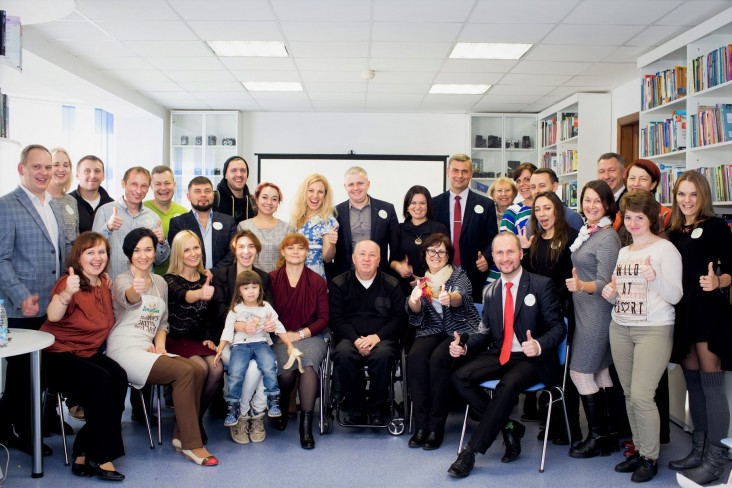Speeches Shim

“The first thing that struck me in the United States was the extent to which businesses were involved in societal issues," recollects Oksana Shevchenko, founder and head of the Belarusian social enterprise Nashi Detki (Our Kids). Oksana was a past participant in USAID’s Community Connections exchange program, which provides Belarusian professionals the opportunity to spend time in the United States, sharing experiences and learning best practices with their American counterparts. "We were exposed to business people and entrepreneurs creating jobs for people with disabilities, tackling environmental problems, and contributing to the improvement of rural areas," Oksana continued. "I returned with a strong belief that I would change the approach to business in Gomel, first, and then in Belarus through promotion and development of social entrepreneurship among local businesspeople."
In 2015, Oksana was inspired to transform her company into a social enterprise. While her children’s toy production business had already incorporated some corporate social responsibility (CSR) principles into its work culture, she wanted to significantly expand its mission. As part of USAID’s Community Connections exchange program, Shevchenko went to Raleigh, North Carolina, to learn about American best practices surrounding social entrepreneurship development. It was only after her visit to the United States that Shevchenko felt empowered to apply the experiences and examples of U.S. social enterprises to her own business in Belarus.
Shevchenko’s belief in the ideals of social entrepreneurship led her to make dramatic changes to her business and beyond. “Social entrepreneurs have an important mission: to care for and support local communities. This concept was incorporated pretty smoothly into my business given that my business partner and my staff were very supportive,” noted Oksana. Within just one year, Oksana and her team fully incorporated a CSR strategy into their business policy. Her business now actively supports various projects for children in Gomel. She regularly participates in welfare events and auctions, supports children from orphanages, and raises money for local rehabilitation centers. Through the U.S. Embassy alumni grants program, Oksana also implemented a seamstress (re)training program for people with hearing impairments, raising the possibility that they might obtain future employment with her enterprise and other local businesses.
Empowered by her success in transforming her business into a social enterprise, Oksana decided to think even bigger. In 2016, she and Yuri Kolesnik, another Community Connections alumnus, led 15 Community Connections alumni from Minsk, Gomel, and Mogilev in piloting a Social Entrepreneur School in Gomel. The following year, the two Community Connection alumni modified their Social Entrepreneur School by redesigning its educational curriculum, opening it to people with disabilities, and involving more domestic and international experts. As a result, the Alumni Engagement Innovation Fund (AEIF), which provides grants for alumni of U.S. government-sponsored exchange programs, supported the School. Thirty-five Community Connections alumni joined local and international professionals in becoming mentors and experts. More than 80 young entrepreneurs and businesspeople who wanted to transform their businesses into social enterprises took part in the school.
In 2019 the School expanded the geography and now function in three Belarusian cities including Gomel, Grodno and Minsk. It is expected that 75 participant from these cities graduate the School in 2020.
Thanks to Oksana’s energy and devotion, her School has become a platform for members of both civil society and private businesses to communicate and collaborate, a rarity in most Belarusian cities. As a result of the School project, Gomel business professionals can now learn how they can address their community’s social needs, while civil society representatives learn about opportunities to implement their ideas in a business-like manner or with local business support.
Since USAID started administering the program in 2006, more than 700 Belarusian professionals have graduated from the Community Connections program, after having been exposed to American best practices and culture through these study tours to U.S. communities. Each year 60 participants visit the U.S. where they are empowered to adapt lessons in leadership and entrepreneurship that help them tackle social and economic development challenges in Belarus.

Comment
Make a general inquiry or suggest an improvement.